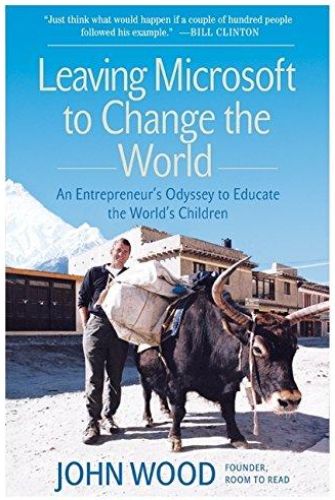Microsoft changed the world. Former Microsoft executive John Wood made it a better place to live: He gave up corporate life to deliver books and build schools for children in the Himalayas.

Someday Come Back with Books
In this remarkable memoir, John Wood, former director of business development for Greater China for Microsoft, details how he founded Room to Read (www.roomtoread.org) to promote literacy first in Nepal, and then in India, Sri Lanka, Cambodia, Laos, Vietnam and Africa.
When he traveled to Nepal in 1999, Woods hadn’t had a vacation in seven years. Discovering that a village school had only a handful of books led the author to an epiphany. Wood details how he set out to “build the Microsoft of nonprofits,” to educate girls and bring libraries to the developing world. He tracks founding collaborative communities in Nepal, Vietnam, Sri Lanka and India. With candor, tenacity and business savvy, Wood tapped his network and inspired donors to create a successful, global nonprofit.
Wood’s account of his vacation revelation and the life-altering actions he took thereafter are immensely entertaining and uplifting. As Publisher’s Weekly noted, “It’s a rare business book that not only provides savvy insights for better business practices, but transcends the category altogether, to rank as an infectiously inspiring read.”
Demonstrating that his years spent running non-profits have not blunted his business acumen, Wood’s other books include Purpose Incorporated: Turning Cause into Your Competitive Advantage. He has also written a sequel to this book, Creating Room to Read: A Story of Hope in the Battle for Global Literacy. Wood proves to be a modern renaissance man, and he provides a sincere, immersing guide for anyone who wants to follow in his admirable footsteps and for those already laboring to nurture a nonprofit.
No Books
When John Wood went to Nepal for vacation, he learned that local children walked for miles to school, and that few of these kids had books. The sparse local schools had no space for more students – or even desks.
Wood reveals that a Nepalese headmaster changed his life by saying, “Perhaps, sir, you will someday come back with books.”
If you want to make the world a better place, don’t focus on the obstacles.John Wood
The author relates sending emails from Kathmandu, asking his friends and relatives to donate used books. Proving his commitment, Wood offered to pay for shipping and match any cash donations.
Wood’s friends sent 3,000 books. When Wood did return with books and saw the happy faces of the children, he knew he would devote his life to this work. Wood reveals that he was a Microsoft shareholder, which tells readers that he was free to walk away as a wealthy man.
From Microsoft, Wood shares that he learned to be “data-driven” and loyal. He describes creating a positive work environment for Room to Read’s dedicated staff and volunteers and emphasizing that every victory is a “team victory.”
Their Own Success
As he was getting started, the author funded the $10,000 budget to build two schools. He discloses that the villagers contributed time and labor. Wood maintains that if people don’t invest their work in their school and simply accept handouts instead they never develop a crucial sense of ownership.
As a case in point, Wood recalls attending a ribbon-cutting ceremony at a new school for which 183 families each donated 1,001 rupees – a lucky number. Wood knew that at the time 1,001 rupees equaled $14 USD – in a community where the average adult earned $1 a day. Wood remarks on the dedication of local women carrying 110-pound bags of cement up the mountain to the site of the school building. Their commitment to a better future for their children inspired him.
Room to Grow
Wood walks readers through the effort Room to Read put forward to create a scholarship program called Room to Grow to educate girls and young women.
Wood explains that for $250 per girl per year, Room to Read pays each girl’s school fees and buys each one a uniform, shoes, a book bag, school supplies, health insurance and a bicycle.
When you educate a boy, you educate just the boy. But when you educate a girl, you educate the whole family, and the next generation.John Wood
Wood’s research demonstrates that a society with educated women has better maternal health, lower infant mortality rates, lower incidence of HIV/AIDS transmission and better food security. As of 2006, Wood recounts, Room to Read already had given scholarships to more than 2,000 girls in Cambodia, Nepal, Vietnam and India.
Room to Read
Between 2001 and 2003, as Wood reports, Room to Read funded chapters in major American cities, Sydney, Paris, Milan and Hong Kong.
After the 2004 tsunami hit Indonesia, Thailand and Sri Lanka, Wood’s CNN interview about his work in the region inspired students in America to raise funds. He reports that middle-school kids sold 70,000 wristbands to fund five schools in Sri Lanka. Additionally, Room to Read raised $2.5 million for the country. By the first anniversary of the tsunami, the nonprofit had reopened 22 schools and had 16 more in progress.
If you ask people to reach deep, to think creatively and to produce extraordinary results, they usually will.John Wood
Wood also notes a milestone: In 2005, Room to Read procured its one-millionth book for one of Nepal’s 2,300 new libraries. When the author saw hundreds of smiling students, he knew his efforts were worthwhile.
Inspiring
This is a self-effacing but truly inspiring memoir. John Woods recognized a terrible situation and gave up his posh western lifestyle to do something about it. He provides a model for tomorrow’s philanthropists by showing precisely how he applied lessons from technology to solve problems in low-tech societies. Wood writes with directness and clarity. He seems determined not to pat his own back, but to encourage readers to get off their backsides. That determination and the accomplishments he presents constitute a singular, noble effort. Though Wood writes for adults, it’s clear that school kids, tweens and adolescents will be deeply interested and will find much to emulate here.





